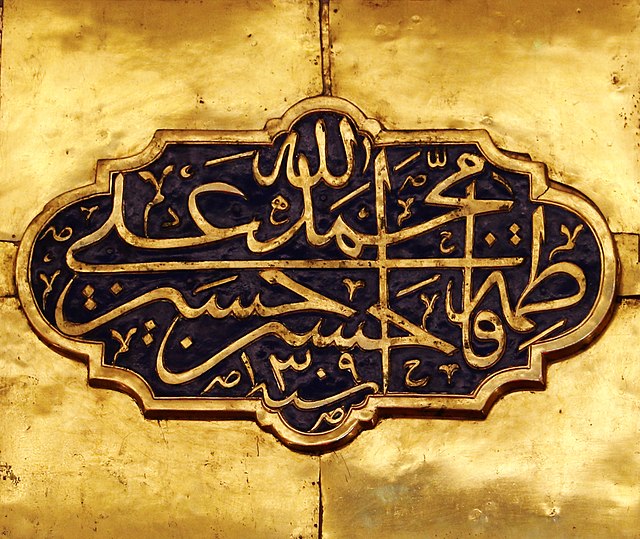Ahl al-Bayt refers to the family of the Islamic prophet Muhammad. In Sunni Islam, the term has also been extended to all descendants of the Banu Hashim and even to all Muslims. In Shia Islam, the term is limited to Muhammad, his daughter Fatima, his cousin and son-in-law Ali, and their two sons, Ḥasan and Ḥusayn. A common Sunni view adds the wives of Muhammad to these five.
Mecca was the birthplace of Muhammad and members of his family, including Ali and Fatima, prior to their migration to Medina in 622. Pictured here is Meccatul Mukarrama Library, also known as Bayt al-Mawlid, because it is believed to stand on the spot where Muhammad was born.
Medina became the home to the Ahl al-Bayt after their migration from Mecca. Pictured in the background is the tomb (marked by the Green Dome) and mosque of Muhammad. In the foreground is the Baqi' cemetery, wherein Hasan and some other relatives of Muhammad are buried.
After the deaths of Muhammad and Fatima in Medina in 632, some of their relatives, including Husayn and Ali, migrated to Iraq and died there. Pictured in the background is the shrine in Najaf where Ali is commonly believed to have been buried, after his assassination in the neighbouring city of Kufa in Iraq.
Names of the Ahl al-Kisa, inscribed in the shrine of Abbas ibn Ali, located in Karbala, Iraq
Shia Islam is the second-largest branch of Islam. It holds that the Islamic prophet Muhammad designated ʿAlī ibn Abī Ṭālib as his successor (khalīfa) and the Imam after him, most notably at the event of Ghadir Khumm, but was prevented from succeeding Muhammad as the leader of the Muslims as a result of the choice made by some of Muhammad's other companions (ṣaḥāba) at Saqifah. This view primarily contrasts with that of Sunnī Islam, whose adherents believe that Muhammad did not appoint a successor before his death and consider Abū Bakr, who was appointed caliph by a group of Muhammad's other companions at Saqifah, to be the first rightful (rāshidūn) caliph after Muhammad. Adherents of Shīʿa Islam are called Shia Muslims.
Ḍarīẖ over ʿAlī's qabr (grave), Sanctuary of Imām ʿAlī, Najaf (present-day Iraq)
Kalema at Qibla of the Mosque of Ibn Tulun in Cairo, Egypt, displaying the phrase Ali-un-Waliullah (علي ولي الله: "ʿAlī is the Wali (custodian) of God").
Jamkaran Mosque in Qom, Iran, is a popular pilgrimage site for Shia Muslims. Local belief holds that the 12th Shīʿīte Imam—the promised Mahdi according to Twelvers—once appeared and offered prayers at Jamkaran.
Shia Muslims gathered in prayer at the Shrine of Imam Ḥusayn in Karbala, Iraq








